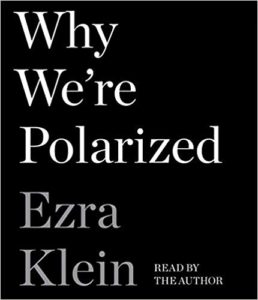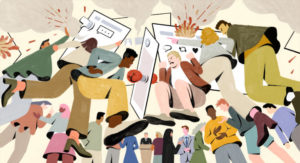“A dysfunctional whole.”
February 11, 2020“The American political system—which includes everyone from voters to journalists to the president—is full of rational actors making rational decisions given the incentives they face,” writes political analyst Ezra Klein. “We are a collection of functional parts whose efforts combine into a dysfunctional whole.”
He traces the feedback loops between polarized political identities and polarized political institutions that are driving our system toward crisis.
#MustListen
Three podcasts:
- On Being with Krista Tippett
- Why Is This Happening with Chris Hayes
- Ezra Klein Show interviewed by historian Jill Lepore
[If you can only listen to one, please choose On Being with Krista Tippett. Beyond the exemplary content, it’s worth noting the calm Krista brings to Ezra’s atypical tempo. She is seemingly able to, through conversation, slow his often rapid delivery allowing reflection, pause and spiritual insight.]
Ezra Klein — How We Walked Into This and How We Can Walk Out
Journalist Ezra Klein has been widely interviewed about his new book, Why We’re Polarized. In this conversation, he’s frank and reflective about what’s at stake in human terms in this political moment. And he describes how we all — Democrat and Republican, journalist and citizen alike — walked into this as a way to trace our steps out of it.
What are the structures that shape people’s decision-making? What are the structures that lead us to be who we are? I think that we often have an illusion that we made a choice for ourselves, when that choice was so fundamentally shaped by who we are and where we grew up and what was around us and what made sense for us to do, that in some final accounting, it was really almost never a choice at all. And I think when you look at the world like that, then it becomes very, very deeply important — it becomes of central importance — that those systems are just and that, in some big way, we are helping people who were born into, or who fell into, the wrong systems.
one of the really radicalizing things for me in the past couple of years has been this question, and it came a lot from my political reporting and talking to members of Congress and watching other journalists and starting Vox, of just: Have we built a system that has structured itself such that it is, at the very least, very hard for people to express the best versions of themselves within it? And I think we have.
I talk about this interview I did with President Obama, in the book. And I talked to him about polarization, and he’s somebody — I interviewed him many times, and I have great admiration for him. And he’s somebody who, I think, in a very deep way, believed that America could overcome its polarization, believed that a lot of that polarization was illusory. And I asked him about it, because at that point in 2015, when we had this discussion, he was quite polarizing. And I asked him about this. And he said, well, look: We all know that we’re one way in politics, but then, when we’re on the soccer or the little league field together, or we’re at the PTA meeting, or we’re talking to our neighbors, or there’s been a storm, we’re very different than that. And so, yeah, then, maybe, when you talk to that person about politics, you can’t believe what they’re saying, but then you look beyond that, and they’re good people. This country is full of good people.
In the past couple of years — and it was actually at the recommendation of Varshini Prakash, who is the executive director of the Sunrise Movement, the climate change movement — I had a conversation with her on my show, and I asked her, what does she do when she thinks about failure? And she said that every day she reads some of the Tao, the Tao Te Ching. And I thought, that’s a strange answer. And so I went, and I had not read it since I was young, when I didn’t get anything out of it.
And this time when I read it, I was really, really, deeply struck by its ideas of non-dualism, its challenge to think about everything is also encoding its opposite. And so much of how we are taught to think — I just think in general, but very much in politics — is, things are one way. They are right, or they are wrong. We got it right, or we got it wrong. This person won, and this person lost. It’s a clean equation that has one answer, every single time. And the deep truth about the Obama presidency is that the DT presidency was within it …
Krista:
And this time when I read it, I was really, really, deeply struck by its ideas of non-dualism, its challenge to think about everything is also encoding its opposite. And so much of how we are taught to think — I just think in general, but very much in politics — is, things are one way. They are right, or they are wrong. We got it right, or we got it wrong. This person won, and this person lost. It’s a clean equation that has one answer, every single time. And the deep truth about the Obama presidency is that the DT presidency was within it …
Chris Hayes:
The title says it all on this one, folks. What is it about the American political system that cultivated this deeply dysfunctional and polarized climate? Last year, we had Ezra Klein on the show to assess how bad things were in the Trump era (conclusion: not great). Now, Klein is back to discuss his new book “Why We’re Polarized” which provides a systematic look at the deep structural defects in American democracy that are manifesting themselves in two coalitions that are increasingly at each other’s throats.
Ezra Klein:
Jill Lepore on what I got wrong.
Jill Lepore is a Harvard historian, a New Yorker contributor, the author of These Truths, and one of my favorite past guests on this show. But in this episode, the tables are turned: I’m in the hot seat, and Lepore has some questions. Hard ones.
This is, easily, the toughest interview on my book so far. Lepore isn’t quibbling over my solutions or pointing out a contrary study — what she challenges are the premises, epistemology, and meta-structure that form the foundation of my book, and much of my work. Her question, in short, is: What if social science itself is too crude to be a useful way of understanding the political world?
But that’s what makes this conversation great. We discuss whether all political science research on polarization might be completely wrong, why (and whether) my book is devoid of individual or institutional “villains,” and whether I am morally obliged to delete my Twitter account, in addition to the missing party in American politics, why I mistrust historical narratives, media polarization, and much more.
This is, on one level, a conversation about Why We’re Polarized. But on a deeper level, it’s about different modes of knowledge and whether we can trust them.
https://podcasts.apple.com/us/podcast/jill-lepore-on-what-i-get-wrong/id1081584611?i=1000464782668

